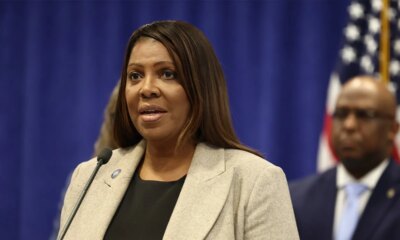Mississippi
Mobile sports betting in MS still has many hurdles. See what passed the House

House Gaming chairman throws cold water on Jackson Casino bills filed this year
Mississippi House passes bill to cut income and sales tax
Rep. Trey Lamar, R-Senatobia, House Ways and Means chairman, presents the Build Up Mississippi Act to cut income and sales taxes.
Mississippians are one step closer to having statewide online mobile sports betting, but hurdles in the Mississippi Legislature still need to be cleared before the idea is totally greenlit.
The Mississippi House of Representatives on Monday passed legislation to establish statewide online mobile sports betting with overwhelming support from chamber members.
The bill was met with some resistance from House Minority Leader Robert Johnson, D-Natchez, who also opposed the legislation in 2024. However, the bill passed with 88 votes in favor and only 10 votes in opposition.
House Gaming Committee Chair Casey Eure, R-Saucier, said the bill will likely head to conference, meaning it will not likely be accepted as is by the Mississippi Senate and will be debated and negotiated for before passing.
The Senate Gaming Committee, which will consider the bill next, is chaired by Sen. David Blount, D-Jackson, who also opposed the House’s mobile sports betting bill in 2024. Blount did not immediately respond to a request for comment.
Eure also said the bill would add millions in yearly revenue to the state via a 12% tax on all mobile sports bets. The money would go to all 82 counties to fund roads and bridges projects.
Johnson, who represents an area with a casino, questioned why tax revenue generated from the legislation would go to all 82 counties when only a few in the state have casinos, such as those along the Mississippi River and Gulf Coast.
“That’s the region that this gambling resource is coming out of,” Johnson said. “This (should not) protect all 82 counties. This (should) protect counties who have suffered through the risk of establishing a casino and have had them there for years. Not the counties that said ‘no’, but to the county that said, ‘Yes.’”
Last year, Eure estimated a mobile sports betting program could be bring in about $25 million in tax revenue.
As for prospective players, the bill would:
- Allow any person within the state to place an online mobile sports bet. Currently, you would need to be on casino grounds to bet online.
- Allow casinos to partner with two online betting platforms to begin online sports betting business.
- Players would not be allowed to use credit cards, but they could use debit cards and online payment options such as Cashapp or Venmo.
- Platforms would be required to age verify players. In Mississippi, players must be 21 years old.
Other states throughout the Southeast have been earning oodles of money in tax revenue from mobile sports betting. For example, Eure said, Tennessee, Louisiana, Kentucky and North Carolina have made tens of millions in sports betting tax revenues since implementing their own programs.
“That just goes to show you that we’re losing a lot of tax revenue to these online sports betting,” Eure said.
Eure said on the House floor the bill added several provisions in addition to what it had last year in order to please some members in the Senate and the gaming community at large.
Last year, the bill died in conference due to concerns that the online betting programs would drive foot traffic away from brick-and-mortar casinos and possibly cost jobs.
Cold water thrown on Jackson casino project bills
Before the vote on mobile sports betting, Rep. William Brown, D-Jackson, asked if Eure had any intentions of supporting legislation to establish a Jackson casino project, which died in the House Ways and Means Committee last year.
Several bills to establish a Jackson casino have been filed into the Legislature this year but as of Monday afternoon none have passed through a committee. Lawmakers have until Tuesday evening to pass such a bill onto either the House or Senate floor.
Eure acknowledged the bill from 2024, but on Monday he said he had heard no such support for a project, and essentially dismissed the idea.
“I’ve had no one contact me, and I’ve had no conversations about a Jackson Casino,” Eure said.
Grant McLaughlin covers the Legislature and state government for the Clarion Ledger. He can be reached at gmclaughlin@gannett.com or 972-571-2335.

Mississippi
Mississippi House of Representatives passes bill to make NIL earnings non-taxable

NIL money comes with a price. More specifically, a tax bill.
The Mississippi legislature is trying to reduce that burden for college athletes who play there.
Via Bea Anhuci of the Mississippi Clarion Ledger, the Mississippi House of Representatives has passed a bill that would exempt NIL earnings from state income tax.
It’s a recruiting tool for Ole Miss and Mississippi State, one that would put the Mississippi schools on equal footing with other states that host SEC universities. Florida, Tennessee, and Texas have no state income tax, and Arkansas carved out NIL earnings from the state’s income tax burden in 2025.
Mississippi currently charges a four-percent tax on anyone making more than $10,000 per year.
NIL earnings remain subject to federal income tax.
The bill will have to also pass the Mississippi Senate, and the governor would then be required to sign it into law.
Mississippi
Why Rebels are keeping pace for Mississippi State CB commit Brandon Allen Jr

Mississippi
Carpenter Pole and Piling invests $5M in Mississippi, creating 10 jobs

Subscribe to Clarion Ledger: Local journalists covering local stories
Clarion Ledger journalists cover the important moments in Mississippi. Support local journalism by subscribing.
Staff
A wood products manufacturer is set to create new jobs as part of a major expansion.
Carpenter Pole and Piling is investing nearly $5 million into its Wiggins, Mississippi, operation.
The expansion will add 10 new positions and support long-term growth in the region.
“Carpenter Pole and Piling is a true Mississippi success story, and we’re proud to see the company continue investing right here at home,” Mississippi Gov. Tate Reeves said.
“This expansion in Stone County is creating new opportunities for hardworking Mississippians while strengthening a company that has long contributed to our state’s economy,” Reeves said. “When Mississippi businesses grow, our communities grow with them, and we remain committed to fostering a business environment where companies can thrive.”
Carpenter Pole and Piling produces utility poles and pilings for marine and foundation use.
The project includes construction of a new treatment plant, investment in a 2,600-cubic-foot autoclave and an alternative treatment option to improve production capacity.
The company is also clearing and preparing an additional 20 acres for a new pole storage yard.
Stone County is also contributing to the project.
The company expects to complete construction by September 2026.
The new roles are expected to be filled by January 2027.
Carpenter Pole and Piling specializes in the production of utility poles. It also manufactures foundation and marine pilings.
The new autoclave will increase production and add an alternative treatment option.
This story was created by business and development writer Ross Reily, with the assistance of Artificial Intelligence (AI). Journalists were involved in every step of the information gathering, review, editing and publishing process. Learn more.
-

 World7 days ago
World7 days agoExclusive: DeepSeek withholds latest AI model from US chipmakers including Nvidia, sources say
-

 Massachusetts7 days ago
Massachusetts7 days agoMother and daughter injured in Taunton house explosion
-

 Denver, CO7 days ago
Denver, CO7 days ago10 acres charred, 5 injured in Thornton grass fire, evacuation orders lifted
-

 Louisiana1 week ago
Louisiana1 week agoWildfire near Gum Swamp Road in Livingston Parish now under control; more than 200 acres burned
-

 Florida3 days ago
Florida3 days agoFlorida man rescued after being stuck in shoulder-deep mud for days
-

 Oregon5 days ago
Oregon5 days ago2026 OSAA Oregon Wrestling State Championship Results And Brackets – FloWrestling
-

 Maryland3 days ago
Maryland3 days agoAM showers Sunday in Maryland
-

 Wisconsin3 days ago
Wisconsin3 days agoSetting sail on iceboats across a frozen lake in Wisconsin






















